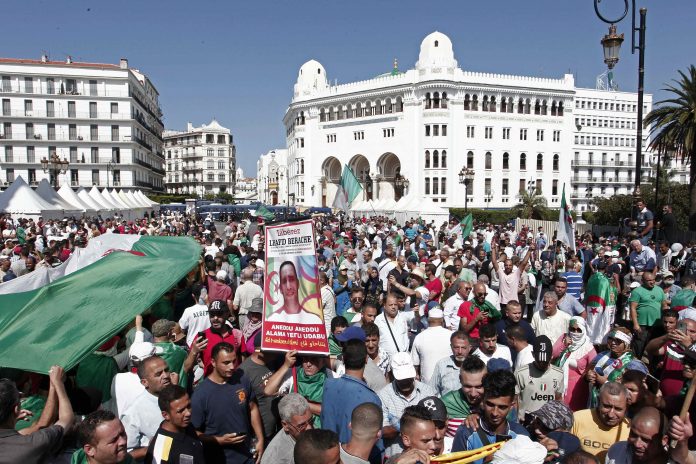
Tens of thousands of protesters piled once again onto the streets of the Algerian capital and other cities Friday with many rejecting the army chief’s call for presidential elections before the end of the year.
This week’s pro-democracy protest, the 29th in a row, is seen as a test of the continued strength of the movement and a way to gauge the temperature of Gen. Ahmed Gaid Salah’s call this week to set a date by Sept. 15 for presidential elections. That would mean voting would be held by law 90 days later — in mid-December.
Algeria has been without an elected president since protesters, helped by the army chief, forced Abdelaziz Bouteflika to resign in early April.
Nationwide demonstrations started Feb. 22 to protest plans by Bouteflika, who was rarely seen in public since a 2013 stroke, to seek a fifth mandate. His administration was mired in corruption and top figures have since been imprisoned, along with leading industrialists.
Protesters now seek a democratic government and want a say in how to achieve that goal. Many opposition politicians are withholding judgment on Gaid Salah’s call for quick elections while others fear that he is seeking a return of a system they reject.
In the absence of an elected president, Gaid Salah has positioned himself as the country’s main authority figure, and sends out messages to Algerians via his numerous speeches to soldiers during visits to barracks.
Many Algerians want a transition period to work out how to proceed, while others want elections but with conditions.
Hundreds of police were posted, like each week, around downtown Algiers on Friday.
Chants included “We refuse to be led by Gaid Salah” and “We’re sick of generals.”
Demonstrations were also held in a number of other cities, including the Kabyle capital of Tizi Ouzou, east of Algiers. And demonstrators demanded “a civilian and democratic nation” in the port city of Oran.
In Algiers, some carried signs bearing the portraits of people imprisoned for “political opinions,” including Lakhdar Bouregaa, 86, a veteran of Algeria’s independence war against France, who had joined protesters.
“Today, the crowd is bigger than recent Fridays … It’s a response to the discourse of Gaid Salah,” Zine Cherfaoui, a commentator with the daily El Watan, said in an interview.q



















